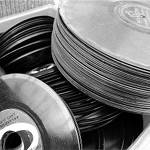When it comes to the history of modern popular music, the importance of the late radio DJ John Peel can hardly be overstated. During his nearly 40-year tenure at the BBC, Peel welcomed hundreds of artists in the studio to record Peel Sessions, from legendary classic rock acts and Grammy winners to under-the-radar indie bands in the late 90s. When he died in 2004, Peel had himself reached legendary status.

As you can imagine, he amassed quite a record collection over the years. In total, Peel owned over 25,000 vinyl LPs and 40,000 vinyl singles. Before long, we’ll all be able to browse his collection on the Web, according to the BBC.
The records will be scanned and digitized along with other personal notes from Peel, interviews, videos and other content. It will be hosted online in coordination with The Space, an experimental digital arts platform created by the BBC and the Arts Council England. The end result will be a sort of interactive museum through which people around the world can peruse Peel’s record collection and learn more about his life’s work.
Whether or not the music itself will be digitized isn’t clear, but in any event, it will likely not be made publicly available due to complex and costly copyright licensing limitations. This is the kind of thing that seems ripe for integration with services like Spotify and Soundcloud, if not digital music stores like iTunes or Amazon’s MP3 marketplace.
What may be more feasible, as the BBC points out, is access to some of the Peel Sessions archives. That audio won’t cover his entire collection, but given the list of artists that recorded in Peel’s studio at the BBC, there’s an enormous trove of potential content there.
This project is just the latest one that aims to preserve musical history by digitizing it. Last month, Universal Music donated over 200,000 masters, discs and tapes to the Library of Congress. The collection, which contains music from the first half of the twentieth century, is the single largest donation of its kind in history.
Digitizing older music is seen as imperative because of the deterioration of physical media that happens over time. John Peel’s LPs may not be at risk of crumbling into dust anytime soon (nor are many of them necessarily rare), but it can’t hurt to start the process now.
Vinyl photo by FourthFloor.

















